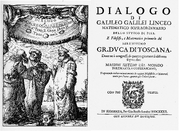No edit summary Tag: sourceedit |
No edit summary Tag: sourceedit |
||
| Line 6: | Line 6: | ||
==''Dialogue Concerning the Two Chief World Systems'' in "[[But It Does Move]]"== |
==''Dialogue Concerning the Two Chief World Systems'' in "[[But It Does Move]]"== |
||
| − | As part of his [[Psychoanalysis (But It Does Move)|analysis]] of [[Galileo Galilei |
+ | As part of his [[Psychoanalysis (But It Does Move)|analysis]] of [[Galileo Galilei (But It Does Move)|Galileo]], Cardinal [[Sigismondo Gioioso]] suggested that the '''''Dialogue Concerning the Two Chief World Systems''''' was a subconcious act of rebellion against both the [[Catholicism (But It Does Move)|Catholic Church]] and Galileo's own [[Vincenzo Galilei|father]]. |
| − | After |
+ | After contemplating this argument, Galileo saw it had some merit. |
{{But It Does Move}} |
{{But It Does Move}} |
||
Revision as of 23:40, 23 September 2016

The Dialogue Concerning the Two Chief World Systems (Italian: Dialogo sopra i due massimi sistemi del mondo) was a 1632 book by Galileo, comparing the Copernican system with the traditional Ptolemaic system.
In the Copernican system the Earth and other planets orbit the Sun, while in the Ptolemaic system everything in the Universe circles around the Earth. The Dialogue was published in Florence under a formal license from the Roman Inquisition. In 1633, Galileo was convicted of "grave suspicion of heresy" based on the book, which was then placed on the Index of Forbidden Books, from which it was not removed until 1835.
The dialogue depicts three fictional characters: Saviati, the Copernican (and Galileo's stand-in); Simplicio, the Ptolemaic, and; Sagredo, an initially neutral layman.
Dialogue Concerning the Two Chief World Systems in "But It Does Move"
As part of his analysis of Galileo, Cardinal Sigismondo Gioioso suggested that the Dialogue Concerning the Two Chief World Systems was a subconcious act of rebellion against both the Catholic Church and Galileo's own father.
After contemplating this argument, Galileo saw it had some merit.
| |||||